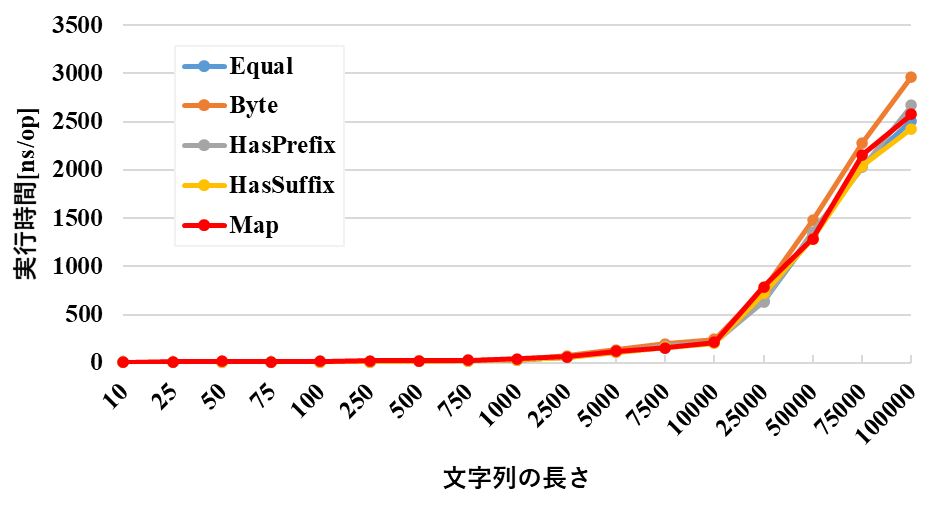はじめに
goで文字列比較をする際にどの方法が早いのか気になったので検証してみました。
比較条件は以下とします
- 文字列の長さを固定
- 完全に一致する2つの文字列を比較
- 10,000,000回(1千万回)繰り返した時の実行時間の平均を測定(go test benchコマンド)
- 正規表現は含まない
比較結果
結果:どれを使ってもあまり変わらないことが分かりました
※ 完全に一致する文字列で検証した場合
凡例は以下の比較方法を表しています。
具体的な実装は各リンク先をご参照ください。
- ①
Equal: 文字列A == 文字列B - ②
Byte: bytes.Compare(文字列A, 文字列B) - ③
HasPrefix: strings.HasPrefix(文字列A, 文字列B) - ④
HasSuffix: strings.HasSuffix(文字列A, 文字列B) - ⑤
Map: map[string]struct{}{文字列A}[文字列B]
測定結果の表
文字列の長さに対して比較の実行時間[ns/op]を示しています。
| Equal | Byte | HasPrefix | HasSuffix | Map | |
|---|---|---|---|---|---|
| 10 文字 | 6 | 4 | 6 | 6 | 9 |
| 25 文字 | 9 | 5 | 7 | 7 | 10 |
| 50 文字 | 8 | 7 | 9 | 8 | 15 |
| 75 文字 | 7 | 6 | 7 | 8 | 12 |
| 100 文字 | 8 | 8 | 8 | 11 | 16 |
| 250 文字 | 12 | 12 | 12 | 14 | 19 |
| 500 文字 | 19 | 19 | 16 | 18 | 23 |
| 750 文字 | 21 | 27 | 20 | 21 | 27 |
| 1000 文字 | 29 | 31 | 29 | 32 | 40 |
| 2500 文字 | 59 | 74 | 63 | 60 | 64 |
| 5000 文字 | 114 | 136 | 107 | 108 | 120 |
| 7500 文字 | 156 | 195 | 179 | 162 | 158 |
| 10000 文字 | 229 | 245 | 206 | 202 | 212 |
| 25000 文字 | 636 | 760 | 635 | 720 | 788 |
| 50000 文字 | 1332 | 1479 | 1357 | 1288 | 1286 |
| 75000 文字 | 2040 | 2280 | 2028 | 2043 | 2157 |
| 100000 文字 | 2507 | 2966 | 2669 | 2425 | 2576 |
なお、参考までに各文字列の長さに対するgo test benchの出力例を示します。
D:\strmatch>go test -bench . -benchmem -benchtime 10000000x -cpu 1
goos: windows
goarch: amd64
pkg: strmatch
cpu: Intel(R) Core(TM) i7-10870H CPU @ 2.20GHz
Benchmark_string_Equal 10000000 2507 ns/op 0 B/op 0 allocs/op
Benchmark_byte_Equal 10000000 2966 ns/op 0 B/op 0 allocs/op
Benchmark_string_HasPrefix 10000000 2669 ns/op 0 B/op 0 allocs/op
Benchmark_string_HasSuffix 10000000 2425 ns/op 0 B/op 0 allocs/op
Benchmark_map 10000000 2576 ns/op 0 B/op 0 allocs/op
PASS
ok strmatch 132.331s
比較用コード
前提
テスト対象の文字列は以下のようにして生成します。
コンパイル時の最適化が走らないように文字列は実行時に生成し、strings.Clone()を使用して比較する2つの文字列が同一のオブジェクトを参照しないようにしています。
STR_LENGTHは文字列の長さであり、テスト毎に変更しています。
var (
STR_LENGTH = 75000
test_str = RandomStr(STR_LENGTH)
target_str = strings.Clone(test_str)
)
func RandomStr(digit int) string {
b := make([]byte, digit)
if _, err := rand.Read(b); err != nil {
return ""
}
var result string
for _, v := range b {
result += string(v%byte(94) + 33)
}
return result
}
また、比較結果を代入した変数が使われていないというgoのエラーを抑制するために以下の関数を定義しています。
func discard(s any) {
}
① 文字列A == 文字列B
func Benchmark_string_Equal(b *testing.B) {
result := false
b.ResetTimer()
for i := 0; i < b.N; i++ {
result = (test_str == target_str)
}
b.StopTimer()
discard(result)
}
② bytes.Compare(文字列A, 文字列B)
func Benchmark_byte_Equal(b *testing.B) {
result := 1
target_str_byte := []byte(target_str)
test_str_byte := []byte(test_str)
b.ResetTimer()
for i := 0; i < b.N; i++ {
result = bytes.Compare(target_str_byte, test_str_byte)
}
b.StopTimer()
discard(result)
}
③ strings.HasPrefix(文字列A, 文字列B)
func Benchmark_string_HasPrefix(b *testing.B) {
result := false
b.ResetTimer()
for i := 0; i < b.N; i++ {
result = strings.HasPrefix(test_str, target_str)
}
b.StopTimer()
discard(result)
}
④ strings.HasSuffix(文字列A, 文字列B)
func Benchmark_string_HasSuffix(b *testing.B) {
result := false
b.ResetTimer()
for i := 0; i < b.N; i++ {
strings.HasSuffix(test_str, target_str)
}
b.StopTimer()
discard(result)
}
⑤ map[string]struct{}{文字列A}[文字列B]
func Benchmark_map(b *testing.B) {
result := false
dict := map[string]struct{}{
target_str: struct{}{},
}
b.ResetTimer()
for i := 0; i < b.N; i++ {
_, result = dict[test_str]
}
b.StopTimer()
discard(result)
}
テストコード全体
テストコード全体
package main
import (
"bytes"
"crypto/rand"
"strings"
"testing"
)
var (
STR_LENGTH = 75000
test_str = RandomStr(STR_LENGTH)
target_str = strings.Clone(test_str)
)
func discard(s any) {
}
func RandomStr(digit int) string {
b := make([]byte, digit)
if _, err := rand.Read(b); err != nil {
return ""
}
var result string
for _, v := range b {
result += string(v%byte(94) + 33)
}
return result
}
func Benchmark_string_Equal(b *testing.B) {
result := false
b.ResetTimer()
for i := 0; i < b.N; i++ {
result = (test_str == target_str)
}
b.StopTimer()
discard(result)
}
func Benchmark_byte_Equal(b *testing.B) {
result := 1
target_str_byte := []byte(target_str)
test_str_byte := []byte(test_str)
b.ResetTimer()
for i := 0; i < b.N; i++ {
result = bytes.Compare(target_str_byte, test_str_byte)
}
b.StopTimer()
discard(result)
}
func Benchmark_string_HasPrefix(b *testing.B) {
result := false
b.ResetTimer()
for i := 0; i < b.N; i++ {
result = strings.HasPrefix(test_str, target_str)
}
b.StopTimer()
discard(result)
}
func Benchmark_string_HasSuffix(b *testing.B) {
result := false
b.ResetTimer()
for i := 0; i < b.N; i++ {
strings.HasSuffix(test_str, target_str)
}
b.StopTimer()
discard(result)
}
func Benchmark_map(b *testing.B) {
result := false
dict := map[string]struct{}{
target_str: struct{}{},
}
b.ResetTimer()
for i := 0; i < b.N; i++ {
_, result = dict[test_str]
}
b.StopTimer()
discard(result)
}
